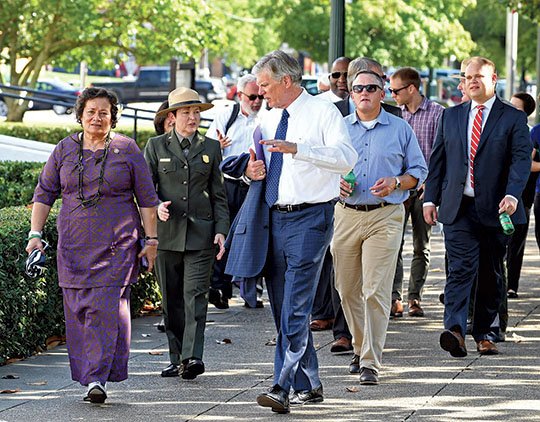The National Park Service's historic leasing program brings private capital and energy to neglected federal properties, but fostering the connection is not without its challenges, a U.S. House committee learned Monday.
The U.S. House Committee on Natural Resources held an oversight hearing in Hot Springs on Monday to hear from those who have negotiated the complex process, one that witnesses said could be less cumbersome and more considerate of the difficulties inherent in securing financing for leasehold improvements that can't be used as collateral.
Bathhouse Row has benefited from the public-private partnership, enabling investments that have repurposed Superior Bath House into a brewery that makes beer from the park's thermal spring waters and Quapaw Bath House into a luxury spa.
Hot Springs Mayor Pat McCabe told the committee during Monday's oversight hearing at City Hall the lack of a security interest in improvements he and his wife, Ellen, are making to Hale Bath House made banks reluctant to finance the project. The couple signed a 55-year lease earlier this year to build a boutique hotel inside the once abandoned bath house.
Without a building or other tangible assets to guarantee their loan, lessees can find it difficult to obtain financing for a leasehold mortgage, McCabe told the committee.
"The National Park Service needs to be sensitive that collateralizing projects of this size can be a challenge for the banks," he said, joking that he was a young man when he and his wife submitted a proposal to lease the empty bath house almost five years ago. He told the committee growing city sales tax receipts convinced him of the viability of opening a boutique hotel downtown.
"I had been a city director at the time, and the numbers I saw coming through on the sales taxes were slowly rising," he said. "I told my wife if you want to get in business, you better do it now. And now is five years later."
McCabe said it took nine months for the bank and National Park Service to negotiate the lease, as the agency initially insisted all proceeds from an insurance claim accrue to it if the building were destroyed in a fire or other calamity. The provision was ultimately reworked to provide some protections for the lender and lessee, McCabe said.
McCabe said the Park Service and Small Business Administration, which guarantees the loans, should recognize the lessee assumes most of the risk. If the enterprise fails, the lessee has to service debt it incurred to bring a federal property back into productive use, while the resulting improvements help address the Park Service's $11.6 billion maintenance backlog.
"If we were to fail, the taxpayers would not really be out anything, as the McCabes would not have profited since the funds expended would have gone into a federal building," he told the committee. "Perhaps there can be some recognition of this fact and the ability for the SBA to gain comfort could be reviewed."
Architect Bob Kempkes, chief executive member of Quapaw Baths LLC, told the committee certain lease components are beneficial, such as allowing lessees to pay $1 a year while they are improving the properties. Kempkes said the lease his group signed in 2007, making the Quapaw the first leased bath house to reopen to the public in 2008, was for significantly less than fair market value.
In addition to giving the group a larger return on a $2.5 million investment that has allowed it to fund a $1.4 million annual payroll, the low rent is also attractive to lenders, he said. The difference in what the lessee pays and what the market recommends creates value that can be borrowed against.
Kempkes said the group has contributed $200,000 to the capital reserve fund lessees are required to seed. The fund receives 2 percent of the lessee's gross annual revenue after two years of operation as a savings account for unforeseen maintenance needs. Fund balances transfer to the Park Service if the lessee leaves the building, Kempkes said, and there's no cap on how much money can be in the fund.
"The reserve should be capped at a certain point," he told the committee. "Two percent of our gross every year is pretty substantial."
Tracy Simmons, chief of commercial services for the Park Service's Midwest region, told the committee the cap can be negotiated, but Kempkes said the federal agency was not amenable to capping the fund when his group suggested it during lease negotiations.
Local on 09/18/2018